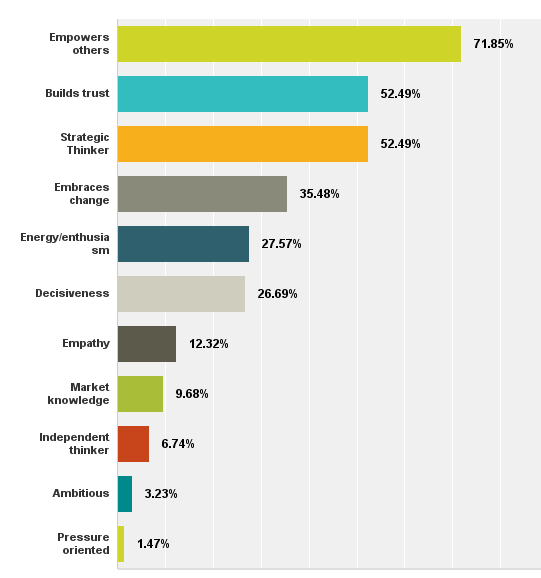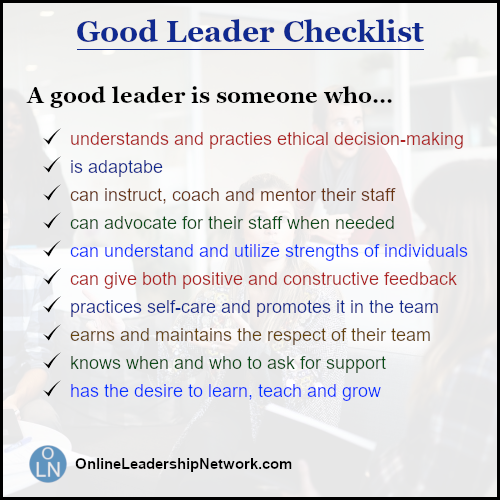One question that Greg and I often get asked is “How to Describe a Good Leader?” Well, we did write a book about that. So, in this article, I will highlight some of our findings from that book, as well as tips and strategies we learned in our leadership careers in the corporate and military worlds. Be sure to read to the end, to get a handy Good Leader Checklist that you can use in your own life.
- Good Leaders Lead Because They Want to Lead
- Good Leaders are Confident
- Good Leaders Are Competent in Their Field
- Good Leaders are Self-Reflective
- Good Leaders are Authentic
- Good Leaders Promote Good Values
- Good Leaders Work Harder Than Their Teams
Good Leaders Lead Because They Want to Lead
True leaders lead for unselfish reasons. They have a genuine desire to help others and accomplish goals.
But the majority of people in leadership positions don’t become leaders because of such noble aspirations. Many are motivated to leadership because of the promise of money, recognition, promotions and status. Some are after power and control. Leadership positions are often seen as a natural progression of one’s career and many people believe that after putting in enough time in an organization they are entitled to be in charge.
Unfortunately, those are all selfish reasons.
And true leadership is about the exact opposite. It’s about being selfless.
When deciding if you want to lead, you should have motives that focus on others, rather than on yourself. You should want to lead because you want to support others. You should want to lead because you want to better support your organization. You should want to lead because you feel you can make a difference.
Wanting money, a promotion or some prestige is not a bad thing, but if you want to achieve those things through leadership, your primary focus should be on others and your organization’s goals.

Good Leaders are Confident
One of the things we address in our book is how to be confident. It’s a tricky subject and many blogs, articles and publications have been dedicated to it – most without practical answers. And yet confidence is a quality good leaders must possess. When you come across as confident, people are more likely to follow you. They are more likely to listen to you, respect you and trust you.
Confidence is a skill and to build it you can focus on a few aspects of your behavior. First of all, you must be competent in your field, or at the very least be on your way to becoming competent. You must also look like a leader. You can achieve that by paying attention to how you dress, how you behave and how you speak. Next, you must be able to stay calm and learn from your mistakes. Making mistakes doesn’t make you a bad leader. Not learning from them does.
Finally, you must know how to interact with your people to motivate and empower them. You can learn this and all the confidence building techniques in our book How to Be a Leader.
Good Leaders Are Competent in Their Field
Remember the competence I spoke about earlier? It’s part of how to describe a good leader. The level of required competence varies, depending on what team and project the leader is leading.
For instance, someone in charge of a team that is preparing a health and fitness workshop doesn’t need to be an expert on health or fitness, as long as they are good at managing people and organizing events. But a foreman in charge of a construction crew must have a decent grasp on construction, or they will be quite ineffective.
If you happen to land a leadership role without knowing enough about the field you are in, don’t panic. It happens more often then you think. Just start taking courses, reading books and getting more and more experience, while relying on your team and your subject matter experts in the meantime. It’s okay to ask your followers how to do something. They will help you as you learn, so that eventually you can make those decisions yourself.
Good Leaders are Self-Reflective
This is a big one. Good leaders constantly evaluate how they are doing. They reflect on their decisions, they review their progress and they work on improving their leadership styles. They evaluate the impact their decisions have on the project and their personnel.
Leaders who do not self-reflect are poor leaders. They show very little growth, if any at all. Don’t be like them. Periodically evaluate how you are doing. Don’t be discouraged by mistakes, but instead evaluate what went wrong and how to improve it next time. This will have a tremendous impact on your leadership ability.
What’s more, once you start learning from your successes and your mistakes, you will empower your team and allow it to grow. Just look at General Eisenhower during the Second World War and his ability to learn from early mistakes and eventually lead his troops to victory.
Good Leaders are Authentic
An authentic leader is someone who is genuine to his or her followers and who’s actions match their words. It’s a leader who sincerely listens to other points of view and makes fair decisions.
If you want to engage your followers, to build trust and respect and end up motivating and inspiring them, you need to be authentic. Your team is composed of smart people and since you are the focus of their attention, all eyes are on you. You get back what you put in. Just think about all those leaders in your life who were not authentic. How did you feel about them?
The good news is that now you have a chance to avoid their mistakes. And an even better news is that the power of how your team will see you and how eagerly they will follow you rests almost entirely with you. Be authentic and you will inspire your followers in ways that are not possible any other way.

Good Leaders Promote Good Values
A lot of buzz has been recently created about values-based leadership – and for a good reason. The world has changed and with it our understanding of power dynamics, organizational structures and social interactions. Some time in the past, we existed in a feudal system where the whims of the few set the conditions for the others. That has changed. In the western world we are much happier now creating relationships and organizations that stand for something other than personal gain. We define that through values.
To be a values-based leader, first understand what your own values are. How do you feel about important issues? Then, understand what the values of your organization are. Read policies and procedures. Know the ethical and moral views of your organization. Talk to other leaders to deepen your understanding.
Good leaders not only exemplify the values of the organization, but they pass them on to their teams. They hold their teams accountable to the values of their organizations. They articulate them clearly and don’t shy away from exploring difficult subjects.
Good Leaders Work Harder Than Their Teams
What does it mean to work “harder” than your team? The word can be subjective and your followers won’t always see the full extent of your efforts. However, if you are sitting in your office constantly bored, or participate in unnecessary meetings while your people put in 40 hours of work per week, your team is working harder than you. If you are always leaving the work early, while others stay till the end – same thing.
A good leader should be last out the door, cancelling frivolous meetings to help out the frontline team if they are overwhelmed. Likewise, a good leader doesn’t take the privilege of his or her position too far. Is your chair the most comfortable, your parking spot the closest to the building, your company trips always the best, your personal coffee station inaccessible to others, your office always the warmest? Yea… you are not as respected as you think and everyone around you knows it.
Being a leader requires care and dedication. However, have no fear. If you are genuinely interested in helping others and getting projects done, all this will come with experience. In the meantime, here is a checklist you can use daily to remind yourself of your goal. Save it to your device to have it available and check it often to see your progress.

And to get a better understanding of how to describe a good leader and get all the leadership skills you need to succeed, you need our book How to Be a Leader. Not only does it give you a better understanding of what I wrote in this article, but it also lays out step by step how-to instructions to help you put all this theory into practice and become successful in any leadership role.



